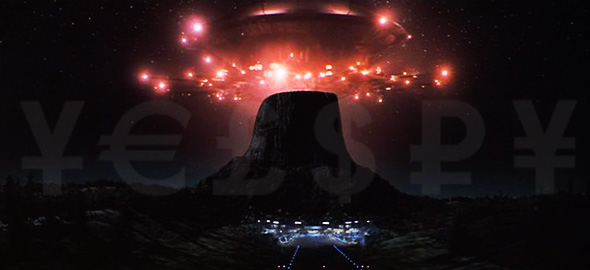From: antiwar.com
by Justin Raimondo, August 15, 2011

Why is the United States constantly at war? If we look at the last half century or so, there is hardly a time when we haven’t been engaged in some major conflict with a purportedly global threat to our very existence. The first such threat was Germany (on two occasions), and its Japanese fascist ally, two regimes whose appeal was nationally-limited and whose inherent instability would have defeated them in any case. The second such “threat” was the Soviet Union, and what Louis Bromfield derided as the “international psychopathic cult” of Marxist-Leninism – both of which collapsed under the weight of their own irrationality as the 1990s dawned.
For a while, there was no Major Threat in sight, and American politics soon reverted back to its pre-WWI “isolationist” slumber. With the drain on our economic resources stanched, investment – and its offspring, technological innovation – picked up: the US economy took off, and we enjoyed an era of prosperity. Unfortunately, this didn’t last long: a new Global Threat soon loomed over the horizon – Islamism!
The 9/11 terrorist attacks were a boon to the out-of-work War Party, and they certainly rose to the occasion: two wars, two ongoing military occupations, and a great swathe of the Middle East added to the American empire. And in just a few short years! Great work, except there’s a few problems: we’re bankrupt, saddled with a $14 trillion debt, the economy is tanking, the real unemployment rate is easily double the “official” rate of around 9 percent, and America has become Food Stamp Nation.
But don’t worry, Paul Krugman has the solution. Speaking with Fareed Zakaria on the news program GPS, he posited the following scenario, riffing off a comment by Harvard economist Ken Rogoff:
“Rogoff: ‘Infrastructure spending, if it were well-spent, that’s great. I’m all for that. I’d borrow for that, assuming we’re not paying Boston Big Dig kind of prices for the infrastructure.’
“Zakaria: ‘But even if you were, wouldn’t John Maynard Keynes say that if you could employ people to dig a ditch and then fill it up again, that’s fine, they’re being productively employed, they’ll pay taxes, so maybe Boston’s Big Dig was just fine after all.’
“Krugman: ‘Think about World War II, right? That was actually negative social product spending, and yet it brought us out. I mean, probably because you want to put these things together, if we say, “Look, we could use some inflation.” Ken and I are both saying that [Rogoff nods], which is, of course, anathema to a lot of people in Washington but is, in fact, what basic logic says. It’s very hard to get inflation in a depressed economy. But if you had a program of government spending plus an expansionary policy by the Fed, you could get that. So, if you think about using all of these things together, you could accomplish a great deal.’
“’If we discovered that space aliens were planning to attack and we needed a massive buildup to counter the space alien threat and really inflation and budget deficits took secondary place to that, this slump would be over in 18 months. And then if we discovered, oops, we made a mistake, there aren’t any aliens, we’d be better –‘
“Rogoff: ‘And we need Orson Welles, is what you’re saying.’
“Krugman: ‘No, there was a Twilight Zone episode like this in which scientists fake an alien threat in order to achieve world peace. Well, this time…we need it in order to get some fiscal stimulus.’”
The word fake is key to understanding Krugmanian economics, which is what passes for liberal or “progressive” economics these days: Krugman believes, like Keynes, that, as Zakaria put it, you can eliminate unemployment by paying people to dig a ditch and fill it up again. It doesn’t matter if workers are engaged in productive activities, according to the Keynes-Krugman crankery, what matters is that they’re in motion, and getting paid to make those motions by the US government.
War, too, puts men in motion, although it’s not the sort of activity one usually associates with productivity – but you’re thinking in the old-fashioned way, which insists on associating economic success with producing products that people want to buy. Instead, Krugman associates prosperity with government as the sole source and producer of wealth via the government printing press. All we have to do, says Krugman – and Rogoff, who did not dissent – is put the pedal to the metal and churn out more dollars. Then we can pay people to dig holes and fill them up again – or, perhaps, blast holes in Iran’s infrastructure and then pay military contractors to “nation-build” once we get in there with the US Army.
Krugman’s canard about how World War II dragged us out of the Great Depression has been debunked by economists on both the right and the left, but plain common sense should alert the non-expert reader to the illogic of this view, let alone its complete lack of any moral sense. Essential goods and services were strictly rationed during the war years, and the relaxation of wartime regulations and controls was bound to create an economic upswing relative to what had gone before. Secondly, the rest of the Western world lay in ruins in the aftermath of the war, while the continental US was spared: this above all explains the postwar economic boom.
According to Krugman and his “progressive” co-thinkers, if the US engaged in constant warfare, and employed the non-military population in the “work” of digging holes and filling them back up again, we could achieve permanent prosperity. Just keep those government printing presses – or, today, pixels on a computer screen – running at top speed.
Full article HERE
No comments:
Post a Comment